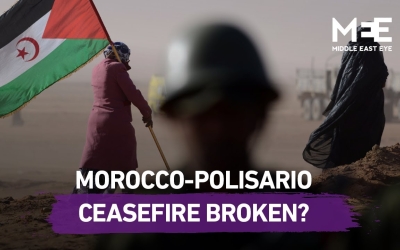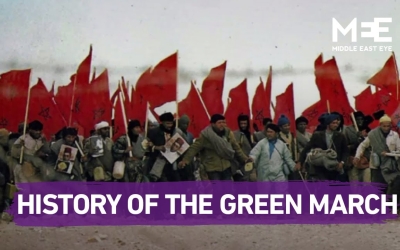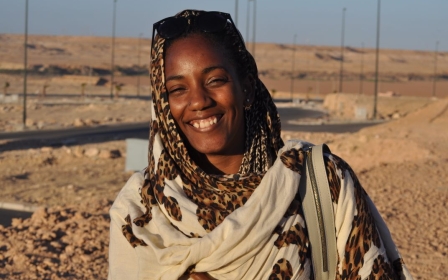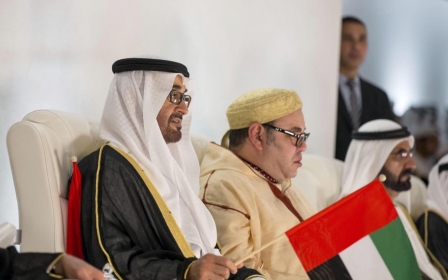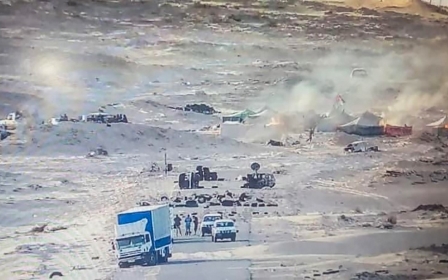Tired of stalemate, Sahrawis support Polisario military action against Morocco
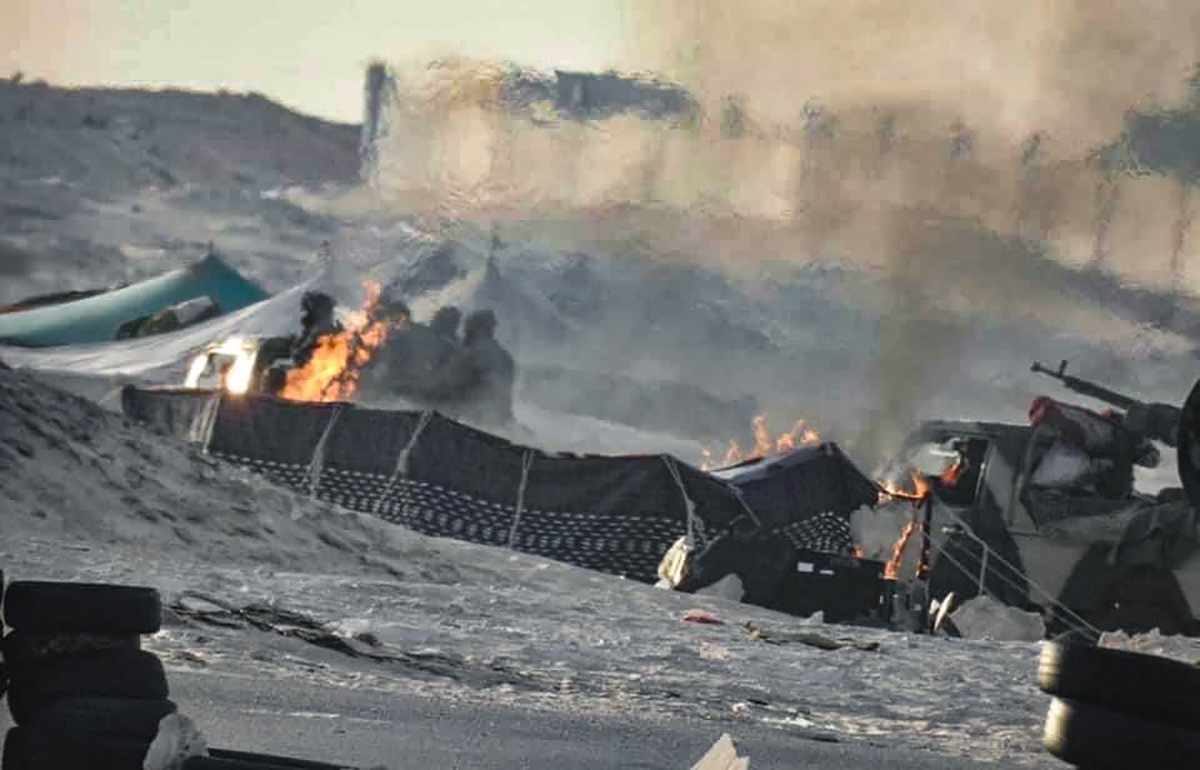
Sahrawis have praised the move by the Polisario Front independence movement to confront the Moroccan army, having had enough of a decades-long stalemate that has kept them from claiming sovereignty over the contested land of Western Sahara.
Tensions in the buffer zone of the North African desert region are still running high a week after Morocco launched a military operation to reopen a key highway at the Guerguerat border crossing between Western Sahara and Mauritania, which it said had been blockaded for weeks by Polisario supporters.
New MEE newsletter: Jerusalem Dispatch
Sign up to get the latest insights and analysis on Israel-Palestine, alongside Turkey Unpacked and other MEE newsletters
Morocco claimed its operation was to pave the road for commercial trucks to cross to Mauritania while Polisario, which is seeking independence for Western Sahara, said it was a breach of the 1991 ceasefire agreement and declared a return to the armed struggle, for the second time since its foundation in 1973.
Morocco said on Monday that it was adhering to the ceasefire and there had only been intermittent fighting in recent days.
However, Kamal Fadel, the Polisario representative in Australia, said the military agreement between the independence movement and Rabat stipulates that all violations are considered both a breach of the deal itself and of the spirit of the peace plan.
“Military Agreement no. 1 establishes a 5 km-wide Buffer Strip (BS) to the south and east of the Moroccan military wall, where the entry of the troops or equipment of both parties, by ground or air, and the firing of weapons in or over this area, is prohibited at all times and is a violation,” Fadel told Middle East Eye.
Morocco built a 2,700 kilometres sand wall in the 1980s along most of the frontier running through the Western Saharan desert to prevent infiltration by Polisario fighters.
Since Friday, the Polisario has issued daily communiques on its Sahara Press Service, in which they identify Moroccan targets that have been reportedly attacked.
In its Thursday communique, the Sahrawi National Ministry of Defence said that the Polisario’s army, the Sahrawi People’s Liberation Army (SPLA), has been fighting for six consecutive days, striking their Moroccan rivals along the military wall and causing “human and material damages.”
‘My people need me’
Military operations by the Polisario have been widely praised by the Sahrawi population. Decades of stalemate has exhausted the population, with the United Nations unable to send a special envoy to Western Sahara for more than a year now.
'Sahrawis have had enough of waiting in the desert for a UN-promised mirage that gets farther away with time'
- Kamal Fadel, Polisario
On Tuesday, in his first appearance after declaring the armed struggle, Polisario's secretary general Brahim Ghali visited the military school where hundreds of volunteers, who have reportedly been mobilised from Sahrawi refugee camps in Algeria, have been training.
Ghali reiterated that the Sahrawi people will continue fighting until “victory” has been achieved for young Sahrawis who are eager to see change in their lifetime.
One of those who recently joined the frontline is Mhamid Mohammed, a 25-year-old Sahrawi who decided to leave Spain and join the movement to fight against the Moroccan military.
“My people need me and I will be there for them,” he told MEE. “My parents have given enough sacrifices and it is my turn to fulfil my duty to achieve an independent Sahrawi state in my homeland, Western Sahara.”
The latest escalation comes as different generations have grown up in refugee camps in Algeria without any resolution surrounding their fate as the indigenous inhabitants of the region, which Morocco claims as part of its sovereign territories.
“Sahrawis have had enough of waiting in the desert for a UN-promised mirage that gets farther away with time,” Fadel, one of Polisario’s young diplomats, told MEE.
Rabat’s strategy
Meanwhile, Morocco has been trying to play down the impact of Polisario operations along the wall and maintained its “steadfast commitment” to the ceasefire. In spite of this, King Mohammed VI threatened to respond with “severity” to any threat to the kingdom’s national security.
When asked why Morocco insists on the status quo situation in Western Sahara, Fadel said that it is part of Rabat’s strategy, which also includes giving “the impression that there is an ongoing political process and betting on time to entrench the occupation, use the resources and create facts on the ground.”
'Morocco has acted more or less with impunity since invading the Spanish-held Western Sahara in 1975'
- Jacob Mundy, Colgate University
“But the Sahrawis are well aware of this strategy and would not be taken in again,” Fadel added.
Jacob Mundy, an assistant professor at Colgate University and co-author of a book on Western Sahara, said that Morocco’s recent military operation in the Buffer Strip was not the first.
“Morocco first began constructing a paved road from Guerguerat to Mauritania in 2016, in what was one of the most significant violations of the UN ceasefire we have seen in decades, and for which Morocco received no sanctions from the Security Council,” Mundy told MEE.
A day after the military operation, Moroccan media reported that the situation at the Guerguerat crossing was stable and that traffic had resumed, while other news reports cast doubt on that version of events.
In a televised report, Al Jazeera Arabic noted that there was no such traffic movement on the Western Sahara borders with Mauritania.
“Morocco has acted more or less with impunity since invading the Spanish-held Western Sahara in 1975,” Mundy said.
Western Sahara, a former Spanish colony, is believed to have significant offshore oil reserves and mineral resources. The Polisario has repeatedly accused Morocco of exploiting the region’s natural resources while half of its population await a referendum in camps and in exile.
The Polisario Front estimates the indigenous population of the Western Sahara to be between 35,000 and 500,000 and has long called for their right to a referendum, something that has also been promised by the UN.
Morocco, which maintains that Western Sahara, annexed in 1975, is an integral part of the kingdom, has offered autonomy but insists it will retain sovereignty.
“In recent years, Morocco has scored several diplomatic gains not only in Africa but more importantly within the Security Council, mainly by shutting down the peace process and for suffering no consequences from stalling or preventing the work of the UN secretary general's previous two envoys,” Mundy said.
Solution lies with US and France
As fighting continues, there has not been any effective response from the international community to contain it before it spreads throughout the region, including Algeria, where at least 165,000 Sahrawi refugees live in camps.
France, the main supporter of the Moroccan proposal of autonomy and the kingdom’s foremost economic partner, has only called for the return to peace talks without any serious pressure being applied.
Meanwhile, the United States is yet to make an official statement to clarify its stance on the latest developments in one of Africa's longest-running disputes in what is often called "Africa's last colony".
The two superpowers were heavily involved in supporting Morocco during its war against the Polisario in the mid-1970s and 1980s.
Relations between Morocco and the US have grown in recent years. The kingdom annually hosts one of the largest training exercises, called the African Lion, organised by the United States Africa Command (Africom). A day before Morocco launched its military operation in Western Sahara, Africom military commanders met with Moroccan generals to prepare for the African Lion.
Stephen Zunes, author and professor of political studies at the University of San Francisco, said he believes that the solution to the conflict in Western Sahara lies with France and the US.
“France and the United States need to stop blocking the UN Security Council from enforcing its resolution and freeze all arms transfers and other security assistance to the Moroccan regime until it upholds its obligations under international law,” Zunes told the MEE.
This article is available in French on Middle East Eye French edition.
Middle East Eye delivers independent and unrivalled coverage and analysis of the Middle East, North Africa and beyond. To learn more about republishing this content and the associated fees, please fill out this form. More about MEE can be found here.


